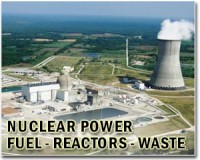 |
Seoul (UPI) Jul 7, 2009 South Korea aims to push to expand "peaceful and commercial" use of nuclear energy in upcoming talks with the United States aimed at revising a nuclear pact signed in 1974, an official said Monday. South Korea is prohibited from reprocessing spent nuclear fuels under the current agreement, which expires in 2014. Minister of Foreign Affairs and Trade Yu Myung-hwan said South Korea plans to form an inter-ministry task force to prepare for the U.S. negotiations, likely to take place later this year, the Korea Times reports. The task force is expected to seek U.S. endorsement of "pyro-processing," a recycling process of spent nuclear materials that Seoul officials say would help develop nuclear energy in a more economic and environmentally friendly way. Pyro-processing is known for being plutonium-free, but could eventually bolster related technologies. Seoul, under the 1992 Inter-Korean Declaration of Denuclearization of the Korean Peninsula, is banned from reprocessing and enrichment activities, including enriching uranium. Spent nuclear fuel and enriched uranium are considered critical procedures for efficient energy development, but they can also be used to produce nuclear bombs. South Korean politicians contend the processes will be used for commercial purposes. Advocates of South Korea's nuclear energy expansion plans say that in pyro-processing of nuclear material, about 95 percent can be recycled as an energy source and 5 percent would become waste. South Korea currently imports 97 percent of its energy requirements. Twenty reactors in the country provide nearly 40 percent of South Korea's electricity. According to the Korea Atomic Energy Research Institute, South Korea uses 4,000 tons of uranium annually, supplied from overseas, producing about 700 tons of nuclear waste. "We'll have to depend much more on atomic energy in coping with climate change in the future," said Minister of Foreign Affairs and Trade Myung-hwan, Seoul's daily Chosun Ilbo reported. "What we are interested in about the atomic energy agreement between the two countries is setting a more concrete boundary of bilateral cooperation for the peaceful use of atomic energy." According to a high-ranking South Korean official, "There seems to be a debate within the (U.S. President) Barack Obama administration as to whether to allow pyro-processing," the Korea Herald reported. "There are some who believe the Obama government may oppose out of commitment towards its campaign on nuclear non-proliferation," the official said. U.S. Undersecretary of State for Arms Control and International Security Ellen Tauscher said in a congressional hearing last month that "programmatic consent'' for reprocessing given to the EU, Japan and India under the Atomic Energy Act of 1954 cannot be extended to South Korea, the Korea Times reported. Share This Article With Planet Earth
Related Links Nuclear Power News - Nuclear Science, Nuclear Technology Powering The World in the 21st Century at Energy-Daily.com
 South Korea courts Poland on nuclear, LNG projects
South Korea courts Poland on nuclear, LNG projectsWarsaw (AFP) July 7, 2009 South Korean President Lee Myung-Bak Tuesday signalled Korean firms were keen to build Poland's first atomic reactor and liquefied natural gas terminal, projects key to its energy diversification bid. "I know that in the context of energy security and diversification Poland is planning to build a nuclear electricity plant and an LNG terminal. Korea has a very strong position in these areas ... read more |
|
| The content herein, unless otherwise known to be public domain, are Copyright 1995-2009 - SpaceDaily. AFP and UPI Wire Stories are copyright Agence France-Presse and United Press International. ESA Portal Reports are copyright European Space Agency. All NASA sourced material is public domain. Additional copyrights may apply in whole or part to other bona fide parties. Advertising does not imply endorsement,agreement or approval of any opinions, statements or information provided by SpaceDaily on any Web page published or hosted by SpaceDaily. Privacy Statement |